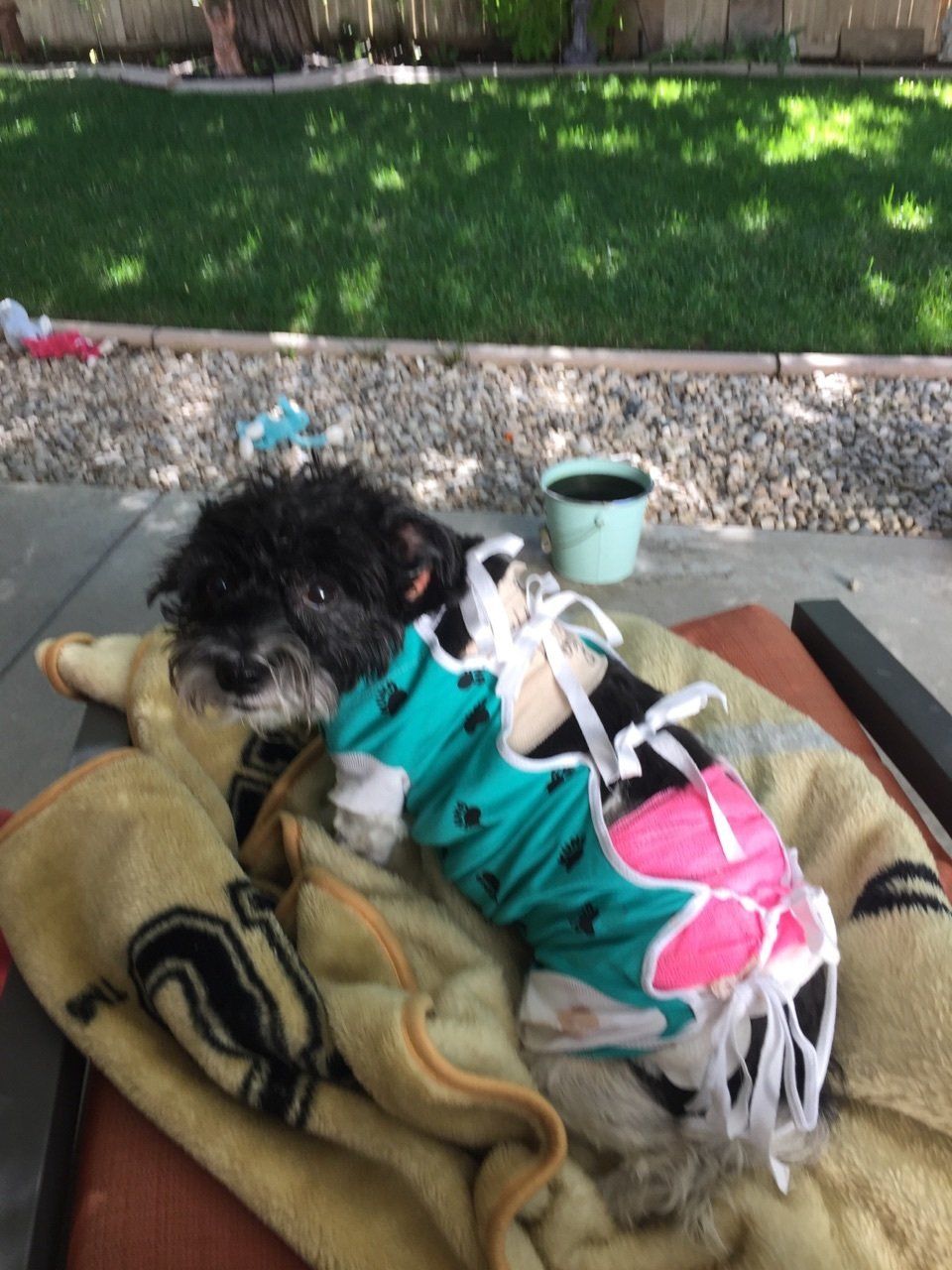The Practice Of Generosity
Not many of us can give a million dollars to a charity today, but every one of us can help a little dog in need.
If you knew, as I do, the power of giving, you
Would not let a single meal pass without sharing
Some of it.
~The Buddha (as found in Salzberg, Lovingkindness , p. 196)
I am walking our two dogs – I like to call them pups, though they are both at least middle-aged in dog years – for a walk. As I often do, we walk up a street leading to a park nearby. Both are on leashes. Both are trotting happily along. The road curves to the right and up ahead I spot a young man with his son, teaching him to ride a bike, it looks. To my left is the entrance to the park.
As we cross the street toward the park entrance another dog runs up from behind and attacks Shelby. He (I will call this dog a “he”) sinks his teeth into our pup’s behind and is not letting go for anything. I have two leashes to juggle and now my two dogs are lunging all around, Shelby twisting and turning. They can’t get away. This dry-gulcher has no collar so I cannot grasp him to get him off Shelby. The attacker is clamped on Shelby’s butt. And of course, he is just growling like anything, ferociously. Shelby is trying desperately to get away. Finally I think to drop both leashes, grab the assailant to try to pull him off, but he still won’t let go. The perpetrator doesn’t have a collar on and so keeps slipping out of my hands. Finally, finally, finally I lift this dog, who has black and white coloring like Shelby’s and is just a bit larger than she is, into the air and he lets go but I can’t then release him because he keeps lunging at Shelby. Mercifully, he doesn’t try to bite me while I am holding him.
I am in desperate straits when, out of the blue, the young man who was playing with his son appears and asks if he can take the bushwhacker from me so that I can take my dogs away. It is a relief. It is like neighbors from miles around showing up with buckets to help save your burning barn.
Both collars are off my dogs by that time. They start trotting toward home and I am now trying to catch up to them.
As we are fleeing, the owner walks up and he feels very badly about it. His kids had left the gate open. We all have had kids who have left gates upon, we have left gates open ourselves, and this can happen to anyone, so I’m not mad. But this is disastrous for us.
Shelby’s flesh was crushed, killing a 2” square of skin. The vets had to cut out and off the dying skin, clean the infection, and then pull and stitch the skin together. We took her every day for days, where she received laser treatment to help the skin heal more quickly, to change her bandages, and to have her wound drained. She was miserable little puppy. Everyone at home gave her a whole lot of love.
There are several take-aways from this experience. One is the generosity of the Good Samaritan who walked up in the middle of this altercation and generously, selflessly, inconveniently, offered to take the dog from me so I could take care of my own pups and get Shelby home. Generosity can be an overlooked and underappreciated virtue I think, until one is the recipient. I shall not forget this selfless, on-the-spot act of generosity given by a young man, with a child, who could have walked away.
Generosity
Developing qualities, dispositions, of “virtues” such as generosity, humility, and charity lead toward quality of life, and are developed over time through regular practices. Generosity is “The virtue of giving good things to others freely and abundantly” (Smith & Davidson, The Paradox of Generosity, p. 4), and has some important qualities:
- It can be learned.
- It is not just an attitude but is also something one does.
- It is “not a random idea of a haphazard behavior, but rather, in its mature form at least, a basic, personal, moral, orientation to life” (p. 4)
- It can include a variety of activities. In their research, Smith and Davidson looked at voluntary financial giving, volunteering for work without pay, expressions of generosity to family, generosity to neighbors and friends, giving blood, and more.
Interestingly and importantly, it is the “practice” of generosity toward others that results in benefits for oneself, not just one-time acts of generosity. And being a generous person has significant benefits. As Smith and Davidson found in their research, “Generous people tend to receive back goods that are even more valuable than those they gave: happiness, health, a sense of purpose in life, and personal growth” (p. 11).
Generosity, I believe and intend to explore more fully, has similar qualities to altruism, charity, the “gift economy”, and kindness. I am interested in the threads that tie these together conceptually and practically. For these are life disciplines and approaches, they are ways-of-living that make everyone’s life better, including the generous one. For now, I consider having a spirit of generosity to be the umbrella for these “giving” qualities.
Not many of us can give a million dollars to a charity today, but every one of us can help a little dog in need.
To conclude, here is advice that theologian Stanley Hauerwas wrote to his godson about generosity. These words, I think, are particularly meaningful these days, when our country is struggling with what it means to welcome others to our land.
"To be generous is to have a disposition toward life and in particular toward other people that’s welcoming. A generous person is a person of hospitality who is ready to share their life with others but also, and even more important, to have others share their lives with them. This isn't easily done because to welcome the stranger, who may be as near to us as a sister, a parent, or a spouse, threatens our ideas about ourselves and our own generosity. That's why generosity depends on great drafts of courage. Courage is required because our lives are so often ruled by unacknowledged fears. It’s particularly important to recognize this because when we do acknowledge our fears, our sense of who we are might be called into question. When we can courageously face these fears and determine who we truly are, we can be truly generous. So a generous person is a person of courage; that courage helps them possess what might be called critical confidence in themselves to live life well. Such a person will manifest a knowledge of who they are in a manner that makes possible the risk of learning to know the other" (Stanley Hauerwas, the Character of Virtue: Letters to a Godson, p. 170).
References/Sources
Hauerwas, S. (2018). The character of virtue: letters to a godson . Grand Rapids, Michigan: William B. Eerdmans Publishing Company.
Ricard, M. (2016). Altruism: the power of compassion to change yourself and the world (C. Mandell & S. Gordon, Trans. Paperback Edition ed.). New York, NY: First Back Bay.
Salzberg, S. (1995). Lovingkindness: the revolutionary art of happiness (1st ed.). Boston: Shambhala.
Smith, C., & Davidson, H. A. (2014). The paradox of generosity: giving we receive, grasping we lose . New York: Oxford University Press.
“Generosity is ultimately an expression of love.”
~Christian Smith & Hilary Davidson, p. 4
“Real happiness is entwined with altruism, since it is part of an essential kindness
That is accompanied by a profound desire that everyone can flourish in life.”
~Matthieu Ricard, p. 692












